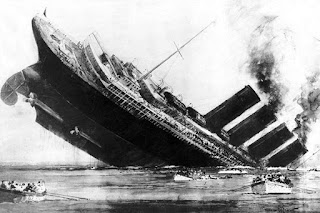Remembering the "War to End All Wars"
When Barbara Tuchman's book "The Guns of August" was released nearly six decades ago, it turned the world's attention on a major conflict that subsequently became dwarfed by the enormous impact of World War II. Yet the subject of her Pulitzer Prize winning book- World War I- was almost as gargantuan in scope militarily, geographically and socially, with 70 million military personnel engaged and more than 16 million persons killed in places ranging from Europe to Africa, the Middle East and China. Also called "the Great War", World War I had a profound impact upon the world order, with the Austro-Hungarian, Ottoman and German empires being radically rearranged or going out of existence, national borders redrawn and nine countries created or restored.
World War I started with a spark- Archduke Franz Ferdinand was assassinated in Sarajevo on June 28, 1914, setting off a diplomatic crisis in the Balkans, the region southeast of Europe which had witnessed turmoil for centuries. Terms like "trench warfare" and "the western front" came into use as politicians tried to describe the scope of this conflict. As nations around Europe began taking sides, it became clear that a major war was imminent. A month after the assassination, Austro-Hungary declared war on Serbia. Germany subsequently declared war on Russia. Russia urged members of what was called the Triple Entente (which included France and Great Britain, as well as Russia) to take a military position and prepare for engagement. The Allies (including Russia, France and Great Britain) faced off against the Central Powers, led by Austro-Hungary and Germany. An interesting footnote of this conflict is the fact that both Japan and Italy joined the Allies (as did the United States, a bit later in the war). Italy and Japan would align themselves with Germany 25 years later in World War II.
The United States was a tardy latecomer to this war, as millions of Americans saw it as "a European affair" in which they did NOT want to be involved. President Woodrow Wilson had a platform running for reelection in 1916 using the slogan "He'll keep us out of war." However, when the British ship Lusitania was sunk by a German U-boat, killing over 100 Americans, tensions in the U.S. rose to a boiling point. Later sinkings of several American merchant ships- and the interception of the "Zimmerman telegram" from Germany linking help from Mexico in the war with later assistance to gain back territory held by the United States- caused President Wilson to declare war on Germany on April 6, 1917.
Some of the largest and most devastating battles in world history occurred in World War I, including the Battle of the Marne and the Battle of the Somme, the latter producing a nearly unthinkable one million casualties (killed and wounded). Chemical warfare reared its ugly head for the first time, mustard gas and other agents causing soldiers to gasp for breath as they dug into their trenches for protection. The war also produced dramatic advances in weaponry as tanks were used for the first time, bringing a new element onto the battlefield.
By 1918, the casualties on all sides were staggering. Germany was finally defeated and ready to come to the negotiating table. The Treaty of Versailles signed on November 11, 1918 attempted to treat all parties fairly, but it had many critics. British economist John Maynard Keynes felt the treaty was unduly harsh towards German and he predicted it would sew the seeds of another war. Keynes was right. Political leaders in Germany felt they had been singled out and treated unfairly. The German economy deteriorated sharply; the deutschmark experienced hyperinflation to the point where citizens were unsure of their nation's future and the economy sank into a downward spiral. These conditions led a disgruntled artist named Adolf Hitler to help form a new political party which would take control in the 1930s.
All those who fought in this great conflict have long since passed from the scene. They're no longer around to teach us its lessons. So, what have we learned from World War I? At a minimum, we should now realize that massive global conflicts cause irreparable damage to families, to communities, to entire nations. In the 21st century, most civilized countries now recognize that chemical weapons are unacceptable tools of warfare. It is unfortunate that some leaders like Syria's Bashar Assad do not subscribe to this line of thinking. Perhaps the war has taught most nations that such weapons must finally be eradicated from the face of the Earth, but that assumption may be too optimistic. It is hoped that today- a century after this war ended- all political leaders around the globe will think twice before engaging in conflicts which could negatively impact the entire world.





Gene,
ReplyDeleteWe seem to be entering "an era of strongman".
Wars on a global scale have had this condition as the prime driver and precursor.
Wmd use was an expected byproduct of global conflict.
Amazingly, chemical weapons were avoided during WWII...only to make an unwelcome return in the modern era. Equily amazing is humanity's abilities to refrain from using nukes.
I don't believe that run of luck will continue.